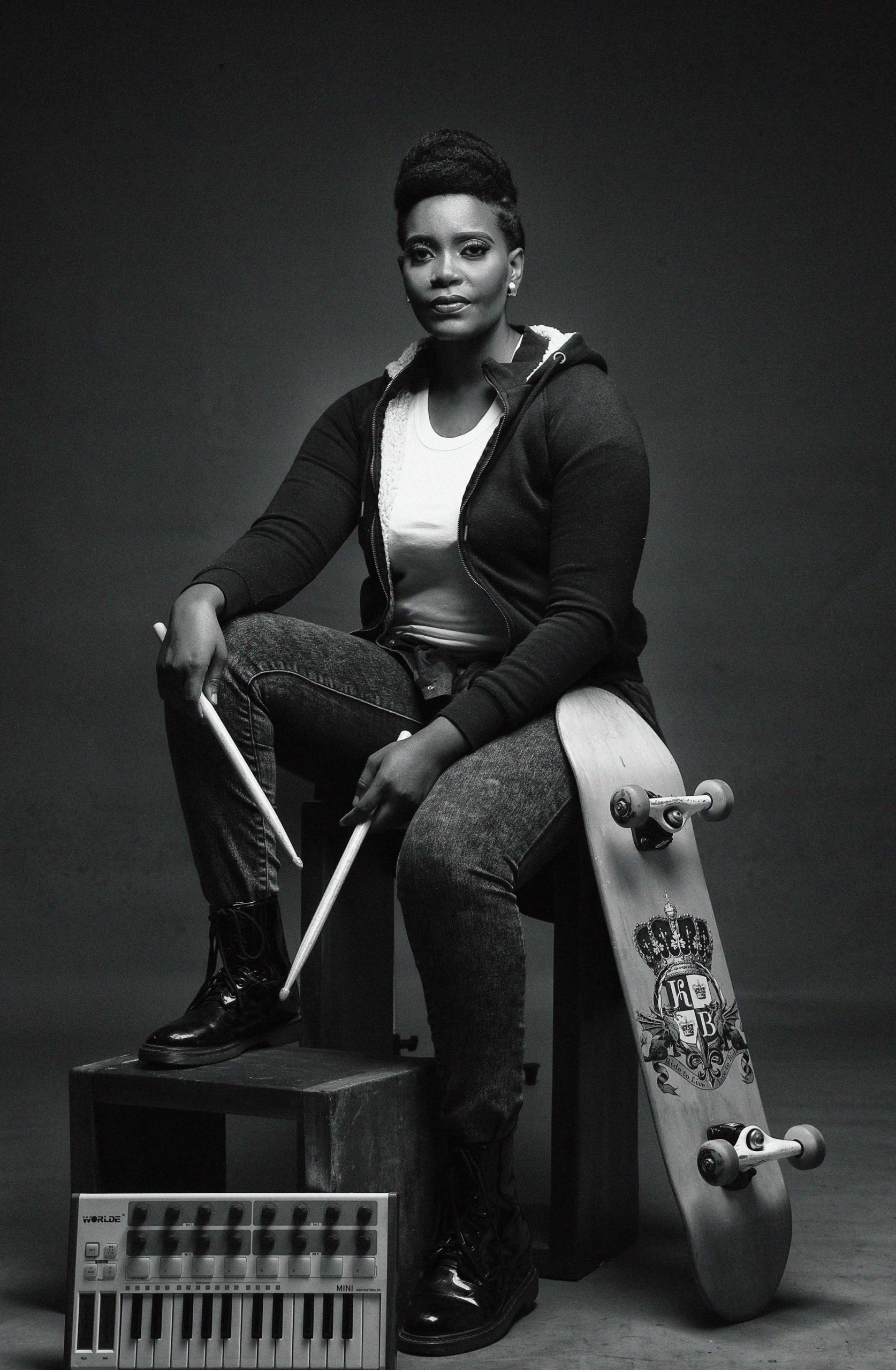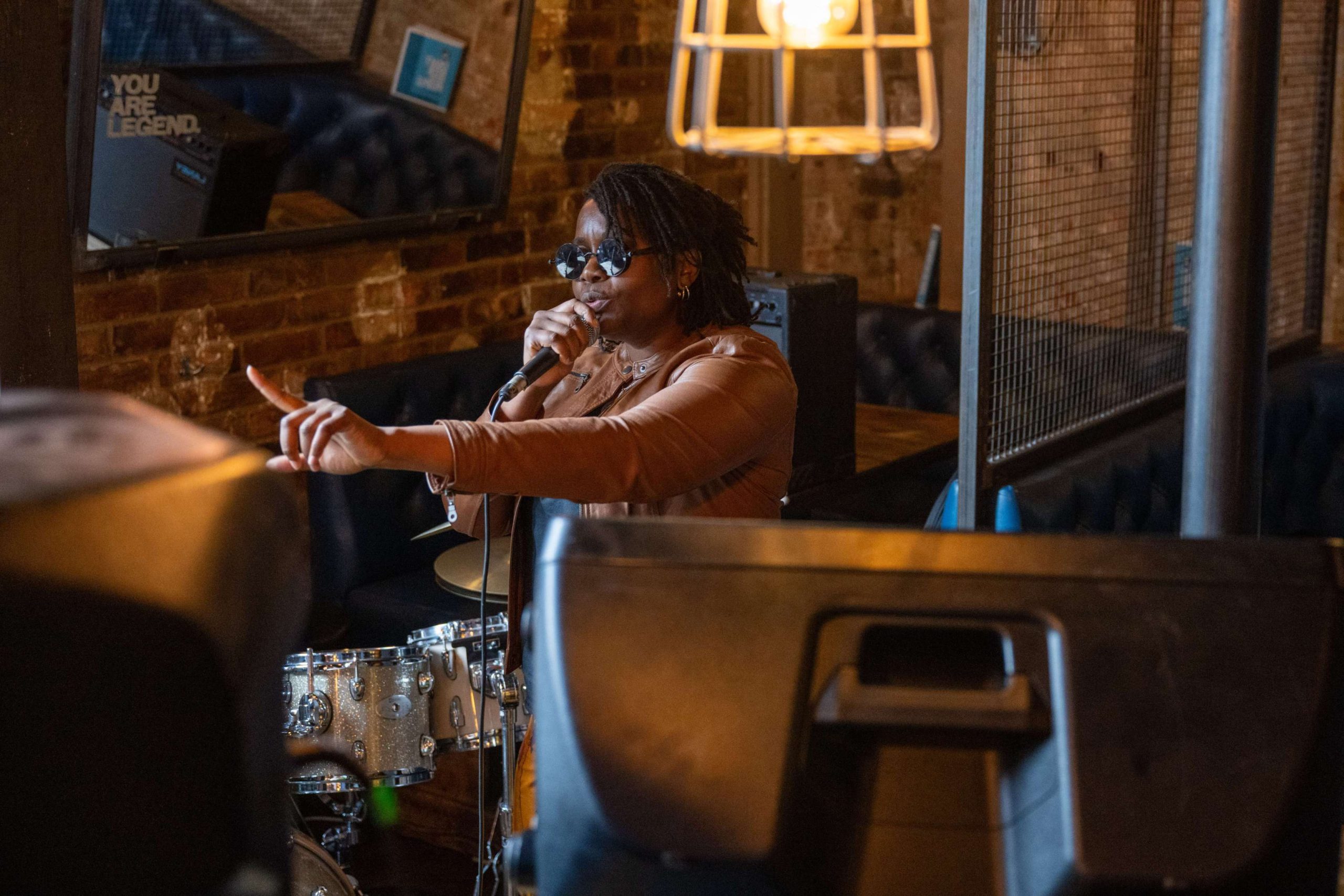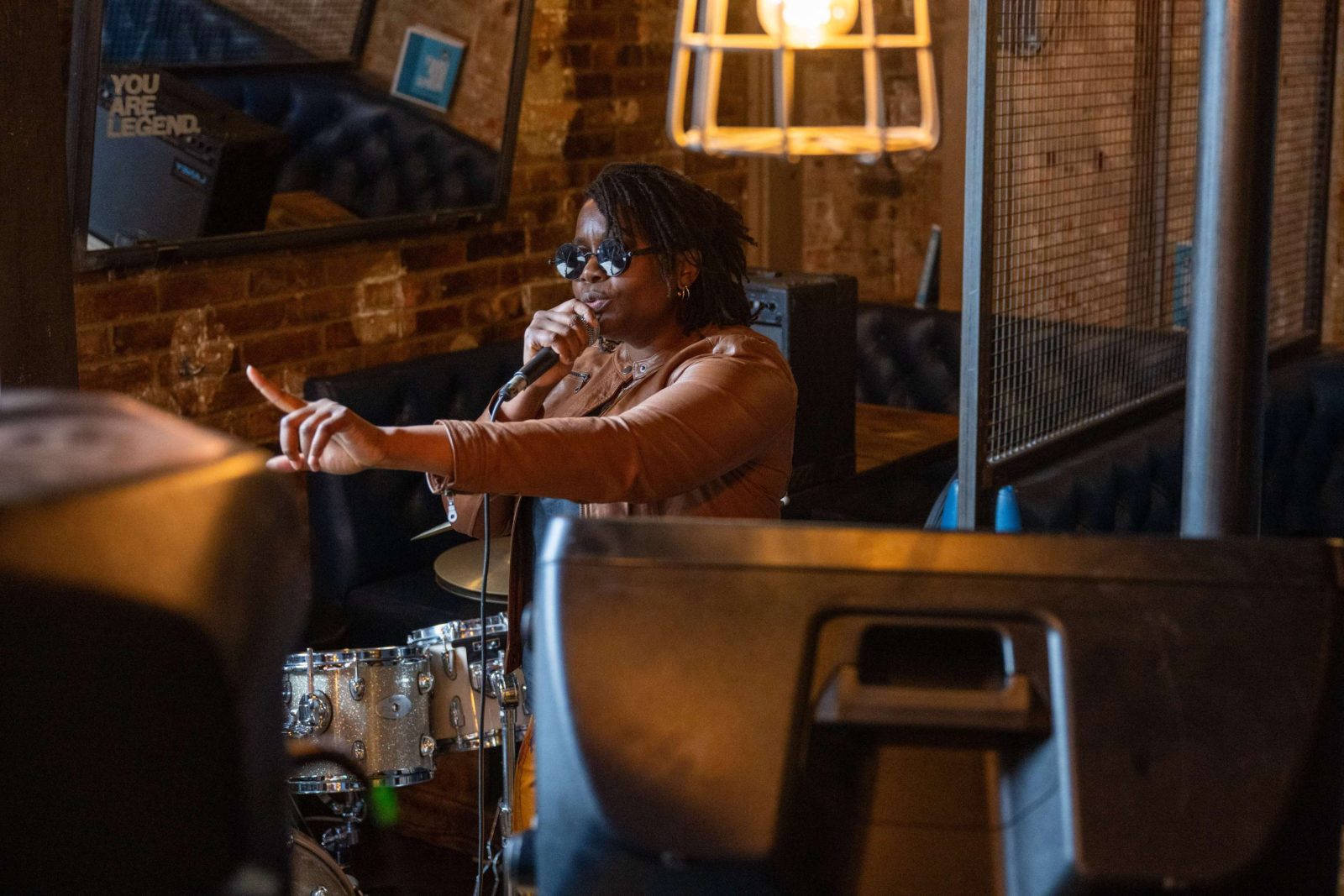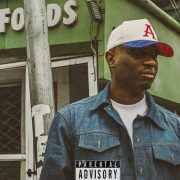Without a pew, a pulpit, and without taking the hours of parishioners, Shona, like a priest, preaches to her listeners about love that is overwhelming, reckless, and unfathomable.
By Emmanuel Daraloye
Boma Beddie-Memberr, a caramel-skinned, talented drummer and rapper popularly known by her stage name, Shona, comes through again. Shona levitates the soul slowly with a renewed masterpiece, “Psalm 23”, of the most widely read chapter by Christians. Her voice feels both divine, as though each lyric is an answered prayer whispered through the holy spirit.
The song starts with the first half of verse 4 of the Psalm 23, “Yea, though I walk through the valley of the shadow of death, I will fear no evil”. This gets accompanied with a playing chord, then swirls the listener’s eardrums and souls with a booming bass and heart-thumping kicks.
With a rhythmically rolled hi-hat and a gentle strike on the snare, this becomes a layer where Shona’s messages rest. Every sound in the mix feels like a spiritual conversation between percussion and the listener.
Shona’s “I boast in the Lord, Shepherd of my soul” repetitive line and chorus, even while a rap, shows the premise of the art. These are words of pride from a daughter who knows that her Father is both the Lion of the tribe of Judah and, of course, the Shepherd of souls. Her confidence radiates through the repetition, transforming worship into rhythm and testimony into melody.
“Psalm 23” by Shona again lets out themes of victory over death and love. Love, the deepest of all secrets God keeps away from man, yet shows it to him. One would quiz himself, why would a Shepherd leave the ninety-nine and follow after only one? This is the celestial love that Shona boasts of in her single, “Psalm 23”. It’s a love song dressed in bars, reminding listeners that faith can be fierce and tender all at once.
Released on the 7th of November, 2025, “Psalm 23”, a rap song by Shona, is one gospel jam that “bams” and passes a message in just words. Without a pew, a pulpit, and without taking the hours of parishioners, Shona, like a priest, preaches to her listeners about love that is overwhelming, reckless, and unfathomable. She does this not with sermons but with sound, using rhythm as revelation and rhyme as her ministry.
“Shadow of death, He light ‘em up” are also powerful words that truly show that He, the Light of this world, has no darkness greater than He can’t light up, or even mountains He can’t tear down, which shows His power over death and its principalities. Each verse paints a vivid portrait of triumph, and this line serves as a bridge that makes the rap more relaxed. Shona’s words become armor for weary souls, a bold reminder that light always finds its way through the shadows.

Shona tells people to tell the devil that he lost another one, which is bravery and pride that can make you overly boast in the Lord. Her tone is unshaken, fearless, and radiant with holy defiance. It’s the sound of victory wrapped in humility, the kind that makes believers stand taller and doubters listen closer.
In “Psalm 23”, Shona raps, and she also ministers through rhythm, bringing together faith and art into an expression of divine confidence. The track shows that Gospel rap can be both spiritually grounding and musically “beautiful” to the ears. With every bar, Shona renews worship for a new generation, reminding listeners that while walking in the “valley of sound”, or death, the Shepherd’s voice still leads. Her voice rises like a psalm itself, steady, sure, soaked in grace.
On the other hand, Shona’s “Psalm 16” continues to echo with a quiet but confident energy.
The two-minute song begins with soft piano chords that set a contemplative mood. Less than thirty seconds in, the drums arrive, steady and intentional, unfolding into a clean trap rhythm. Every sound feels deliberate. The piano holds the air open while her percussion anchors it. As both a rapper and a trained drummer, Shona’s command of tempo is evident. Nothing overreaches. Her vocals glide over the beat, measured yet filled with conviction.
The opening lines, “New day new sound, praise God, the one from dawn to dusk”, immediately establish the song’s reflective and devotional tone. She continues with, “They steady tryna faze me, they steady tryna test me. Faze me, test me. But everything they tryna operate. Everything of mine, is yours, the source. No separating those who know their source”, setting a framework of trust and surrender over the trap rhythm.
A key strength of “Psalm 16” lies in Shona’s masterful use of lyrics to convey both devotion and resilience. She blends repetition with rhythm to create a meditative flow, turning simple phrases into affirmations that resonate beyond the track’s brief runtime. Lines such as “I in you. You in I. You and I” communicate a profound sense of connection, while “Take refuge in your hands, safer in your heart” pairs vulnerability with assurance.
The lyrics also carry an instructive quality, encouraging listeners to be light in darkness: “Gotta be light in dark places. Just be the light.” By layering concise, deliberate phrases over a trap beat, Shona ensures that the message is both heard and felt, blending spirituality with modern rhythm in a way that feels natural and heartfelt.
Behind this sound is a story of persistence. Shona, a recent graduate of the Worship Artistry Diploma program at Bethel Music College in Redding, California, has steadily built her career through both skill and intention. She draws from Afrobeat, Reggae, and House, merging them with Hip-Hop to create music that carries warmth and conviction.
Her artistry is influenced by the precision of Tony Royster Jr., the passion of Calvin Rodgers, and the creativity of Carlin Muccular, drummers whose excellence helped shape her discipline and sound. These influences surface in her rhythmic sensitivity and in the balance she brings between control and flow.
Shona also finds community in platforms such as DrumQueen, More Than a Drummer, and Africa’s Drummers Network, spaces that foster collaboration and growth for percussionists worldwide. In 2020, she was a finalist in the Voice2Rep program, a music project launched by Accountability Lab, the Dutch Embassy, and Chocolate City, aimed at showcasing and amplifying socially conscious music artists and advocacy. These experiences have helped shape her as an artist who merges purpose with performance.

As a woman in two male-dominated spaces, drumming and rap, Shona has become an emblem of quiet defiance, showing that excellence can coexist with humility. Leading up to the release of “Psalm 16”, she engaged her audience on Instagram, asking followers to vote between two proposed cover designs for her upcoming EP.
The post drew more than twenty responses and reflected her growing connection with her community of nearly three thousand followers. In 2024, Oxford’s music magazine listed one of her previous tracks among its Tracks of the Year, a milestone that positioned her as an emerging voice in faith-inspired Hip-Hop.
“Psalm 16” captures an artiste at peace with her purpose. The piano and percussion intertwine like breath and heartbeat, while her lyrics turn personal devotion into public testimony. It is a song of refuge and renewal, one that feels less performed than lived. In “Psalm 16,” Shona transforms worship into rhythm and rhythm into faith. The result is a piece that listens inward but speaks outward, reminding her listeners that music, at its purest, is still a conversation with the divine.
Shona’s delivery and flow in “Psalm 23” and “Psalm 16” are marked by a rhythmic precision and emotional conviction that enhance the spiritual messaging of the songs. Her vocal performance channels a balance of strength and vulnerability, with a flowing cadence that conveys both worship and testimony, allowing the lyrics to feel deeply personal yet universally relatable. The rhythmic elements also support her rap vocal flow, adding momentum without overpowering the words. This synergy between voice and beat creates an impactful listening experience, where emotion and rhythm work together to engage and uplift the audience.
From a production standpoint, the beat is thoughtfully arranged to reflect the themes of each track, blending Gospel with Contemporary Trap and Hip-Hop influences. The mixing takes on a raw approach.
Culturally, these songs resonate with contemporary trends in Gospel Rap by combining worship with modern Hip-Hop beats, reflecting a movement towards faith-inspired music that speaks to younger, diverse audiences navigating both spirituality and social realities. Compared to her earlier work and peers in the Christian Hip-Hop scene, Shona’s tracks demonstrate artistic growth with distinctive rhythmic sensitivity and thematic focus.
Overall, these songs are strong in conveying faith and resilience, though further exploration in lyrical depth and dynamic production could enhance their breadth. Shona’s songs definitely appeal mainly to listeners exploring the Christian faith, and will reach audiences outside the 4 walls of a church building.
Emmanuel Daraloye is Africa’s most prolific music critic. He has more than 600 album reviews in his archive. Email: emmanuel.daraloye@afrocritik.com




